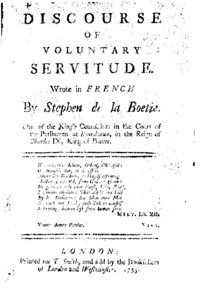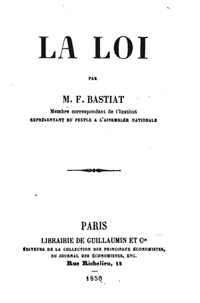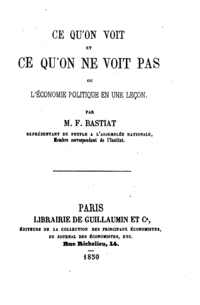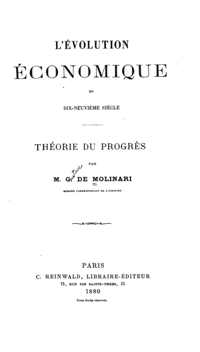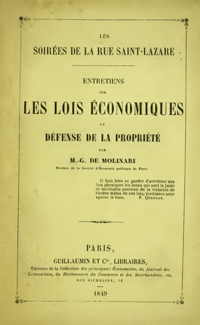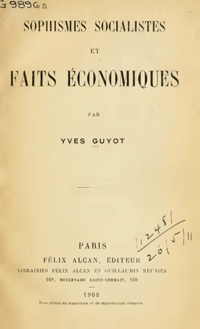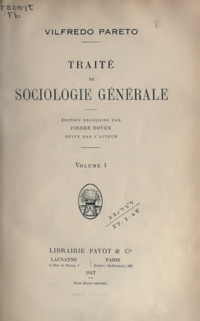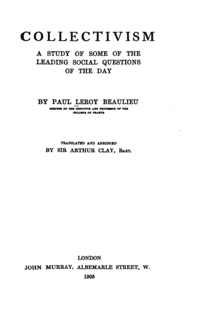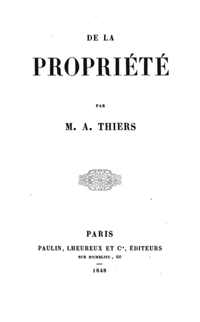

|
- An Anthology of Articles from Le Censeur and Le Censeur européen (1814-19) by Charles Comte, Charles Dunoyer, et al. There are 17 from Le Censeur (1814-185) and 18 from Le Censeur européen (1817-1819). This brings together in one volume an earlier collection of separate essays.
In the standard HTML format; eBook HTML and PDF and ePub; the zipped collection of files.
- further additions to my anthology of essays from Le Censeur (with 16 items) and Le Censeur européen (with 18 items):
- Dunoyer, “De l’influence de l’opinion sur la stabilité des gouvernemens; et de la discordance qui existe entre l’esprit des peuples de l’Europe et la politique de leurs chefs,” (T.6, June 1, 1815), pp. 141-60. - HTML and facs. PDF. In this essay Dunoyer takes up some ideas about the power of ideas and public opinion expressed by Benjamin Constant in De l'esprit de conquête et de l'usurpation (1814) where he argues that the ideas held by the ruling elite are based upon war, conquest, monopoly and depotism; while those of ordinary people are increasingly based upon peace, industry, trade, and liberfty. This conclict of ideas led to the emergence of pro-liberty movements which reached a peak with the American and French Rvolutions and will continue into the coming century.
- An early work by Dunoyer in which he lays out his class theory of history. There is a two way struggle between the ruled and the rulers, and at the same time within the class of rulers, a three or even four way struggle between the king, the nobility, the clergy, and later the lawyers in the Parlements. Throughout the centuries of these struggles the ordinary people of France have been kept in a state of subjection and have thus not been able to develop what he calls “pubic spirit”, by which he means a sense of their own identity, patriotic feelings towards a broader community with common goals, and a sense of individual liberty. See ”De L’esprit public en France, et particulièrement de l’esprit des fonctionnaires publics” (July 1814) - Part 1 [HTML and facs. PDF] and Part 2 [HTML and facs. PDF].
- when Le Censeur was first published as a bi-weekly short news magazine Charles Comte wrote a very forthright and rather cheeky letter to the Minister of the Interior explaining why he supported freedom of speech. This was rather prescient as Comte and Dunoyer would run afoul of the censors repeatedly during the course of its history, having volumes consificated and being brought before the courts and even spending time in prison for what they had written. See “Lettre au ministre de l'intérieur, sur la liberté de la presse, considérée dans ses rapports avec la liberté civile et politique.” Le Censeur No. 3. (5-13 July 1814), pp. 75-110. - HTML and facs. PDF
- Dunoyer (??), [CR], “De La Traite et de l'esclavage des noirs et des blancs” (T.4, Mar. 1815, )pp. 210-30 - HTML and facs. PDF In this review (unsigned but probably by Dunoyer) Dunoyer debunks some of the economic reasons used to justify slavery, shows that Haitians were just as passionate about liberty as white Europeans, and likens Napoleon to a slave owner whose slaves are white and not black, where his slaves are French citizens who were conscripted into the army or were taxpayers who were forced to pay for the wars.
- Charles Dunoyer [CR], “Essai sur les désavantages politiques de la traite des nègres, par Clarkson” (T.2, 15 Nov. 1814) - HTML and facs. PDF. In this review of a book by the English abolitionist Thomas Clarkson, Dunoyer vehemently denounces the immorality of slavery and argues that the "political" opportunities which existed in Britain to argue for the abolition of slavery on other than moral grounds did not yet exist in the France. Nevertheless Dunoyer argues that the only way to increase the prosperity of the colonies and compete with Britain was to free the French slaves.
- Charles Comte, “S’il est permis de tuer un tyran” (T2, Nov. 1814), pp. 267-80. - HTML and facs. PDF. Comte discusses the ancient Greek and Roman belief that it is legitimate for a private citizen to kill a tyrant. Whether the principle applies to his own time is a matter of dispute: yes when Napoleon first came to powerand was clearly a usurper; no when Emperors or Kings lived under a constitution and there were elections.
- Charles Comte, [CR]. “Traité d'économie politique par JB Say,” (T.7, Sept. 6 1815) - HTML and facs. PDF. The economic treatise by JB Say was a revelation for Comte and Dunoyer and his free market ideas changed their entire view of what classical liberalism was. This was the first review. A second one of the revised 3rd edition came after the journal was closed down by the censors and reopened again in Jan. 1817. [HTML and facs. PDF]
- Charles Dunoyer, "Des Révolutions en général, et des révolutionnaires actuel” (T.3, Dec. 1814) - HTML and facs. PDF. Here Dunoyer argues that as societies evolve they are in a state of "permanent revolution" which wise governments have to learn to manage if they wish to avoid a violent revolutionary explosion of political and economic reforms
- I have updated the Table of Contents for the 7 volumes of Le Censeur (1814-15) to include page numbers for each article and the name or initial of the authors (where known)
- more essays for my anthology of articles by Comte and Dunoyer in Le Censeur which I began working on last September. Here are some new ones:
- Charles Comte et Charles Dunoyer’s “Avant-propos”, (CE T.1, Jan. 1817) - [HTML and facs. PDF]
- Charles Dunoyer, “Du système de l'équilibre des puissances européennes” (T.1, Jan. 1817) - HTML and facs. PDF. This has a very interesting critique of Benjamin Constant's essay De l’esprit de conquête et de l’usurpation (1814). CD argues that it is too soon to say that "the spirit of industry" has become more widespread let alone predominant over "the spirit of war and conquest" which BC was arguing.
- Comte's review of “Manuscrit venu de Sainte-Hélène d'une manière inconnue” (T.3, May 1817) - HTML and facs. PDF which is an analysis of Napoleon's political and economc views as expressed in interviews with his captors
- Dunoyer's review of Augustin Thierry's “Des Nations et de leurs rapports mutuels” (CE T2, Mar. 1817) [HTML and facs. PDF]
- Comte's review of Saint-Simon's “L'Industrie, ou Discussion politiques, morales et philosophiques, dans l'intérêt de tous les hommes livrés à des travaux utiles et indépendans" (T.3, May 1817) - HTML and facs. PDF
- Augustin Thierry, “Des factions” (CE T3, May, 1817) [HTML and facs. PDF]
- Augustin Thierry's review of "Commentaire sur l'Esprit des lois de Montesquieu, suivi d'observations inédites de Condorcet, sur le vingt-neuvième livre du même ouvrage" (T.7, mars 1818) - HTML and facs. PDF
- [G.F.=CC??] [CR], “De la Réorganisation de la société européenne, etc., par M. le comte de Saint-Simon et de Thierry” (T.4, March, 1815) - HTML and facs. PDF - written while the Concert of Vienna was discussing the future political shape of the European system of states, Comte argues that something similar to the American federation of states would be the best way to solve Europe's political problems.
- [CC??], “De l'Autorité légitime et du gouvernement parlementaire” (T.4, March 1, 1815) - HTML and facs. PDF
- Anon., “Considérations sur la situation de l’Europe, sur la cause de ses guerres, et sur les moyens d’y mettre fin” (T.3, Dec. 1814) - HTML and facs. PDF - another essay which advocates a federation of constitutional monarchies in Europe based jupon the American model in order to bring an end to war between European states
- [CC], [CR] “Principes de politique applicables à tous les gouvernements représentatifs, et particulièrement à la constitution actuelle de la France; par M Benjamin Constant, conseiller d'état,” Le Censeur T. 7 (6 Sept. 1815), pp. 78-115. - HTML and facs. PDF. Comte critically reviews a work on consitutional government by Constant, who decided to work for Napoleon after he returned temprarily to power and was criticised by some radical liberals for "selling out" to power. CC notes in particular BC's support for some censorship of political dicsussion and his view that owners of landed property but not "industrial" property should have the right to vote.
- Charles Comte “Avertissement” (T.1b, Sept. 1814) - HTML and facs. PDF
- Augustin Thierry, [CR] “Manuel électoral à l’usage de MM. les électeurs des départemens de la France” (T.2, March 1817), pp. 107-68. - HTML and facs. PDF - Thierry applies his theory of "industrialism" to argue that only those who are engaged in productive economic activiity (the "industrial class") should be allowed to stand for election.
- [CC??], “Des sectes politiques. Dialogue entre un Royaliste, un Royaliste constitutionnel, un Républicain et un Métaphysicien,” (T.1, July 1814), pp. 41-57. - HTML and facs. PDF. Here Comte tries his hand at a "dialogue" between representatives of three political points of view, with the "metaphysician" (CC) getting the upper hand and the last word.
|



